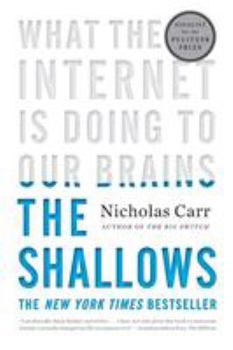The Shallows: What the Internet Is Doing to Our Brains
Select Format
Select Condition 
Book Overview
Now, Carr expands his argument into the most compelling exploration of the Internet's intellectual and cultural consequences yet published. As he describes how human thought has been shaped through the centuries by "tools of the mind"--from the alphabet to maps, to the printing press, the clock, and the computer--Carr interweaves a fascinating account of recent discoveries in neuroscience by such pioneers as Michael Merzenich and Eric Kandel. Our brains, the historical and scientific evidence reveals, change in response to our experiences. The technologies we use to find, store, and share information can literally reroute our neural pathways.
Building on the insights of thinkers from Plato to McLuhan, Carr makes a convincing case that every information technology carries an intellectual ethic--a set of assumptions about the nature of knowledge and intelligence. He explains how the printed book served to focus our attention, promoting deep and creative thought. In stark contrast, the Internet encourages the rapid, distracted sampling of small bits of information from many sources. Its ethic is that of the industrialist, an ethic of speed and efficiency, of optimized production and consumption--and now the Net is remaking us in its own image. We are becoming ever more adept at scanning and skimming, but what we are losing is our capacity for concentration, contemplation, and reflection.
Part intellectual history, part popular science, and part cultural criticism, The Shallows sparkles with memorable vignettes--Friedrich Nietzsche wrestling with a typewriter, Sigmund Freud dissecting the brains of sea creatures, Nathaniel Hawthorne contemplating the thunderous approach of a steam locomotive--even as it plumbs profound questions about the state of our modern psyche. This is a book that will forever alter the way we think about media and our minds.
Format:Paperback
Language:English
ISBN:0393339750
ISBN13:9780393339758
Release Date:June 2011
Publisher:W. W. Norton & Company
Length:280 Pages
Weight:0.59 lbs.
Dimensions:0.8" x 5.4" x 8.2"
Customer Reviews
1 rating
Very applicable to modern life
Published by Travis Bookreader , 7 months ago
If you can work through the first 40 pages, which are needed to lay a lot of the groundwork for Carr's bigger ideas, there are a lot of rewarding conclusions and insightful discoveries. I was impressed by the simplicity that Carr broke down decades of research and literature into digestible paragraphs. His work helps us understand how our thoughts behave within the online space and the effect this "immediacy" has on our memory. The book touches on the difference between "working memory" and long term memory - and the history of how society and technology have encouraged different styles of thinking. There was a lot more history about other forms of technology than I expected, but it helped to contextualize the computer relative to other technology types which also provided great change (clock, printing press, calculator, phones, etc). Overall he did a great job of showcasing some of the caveats of the internet, while also touching on the benefits it can provide. Even though this book is almost 15 years old as of 2024, it's still very relevant. As someone who works on a computer everyday, this book was a breath of fresh air. It gratified a lot of the things I've felt, but couldn't exactly put words to.






